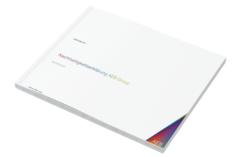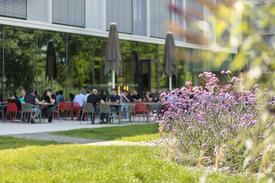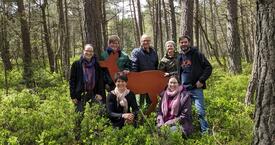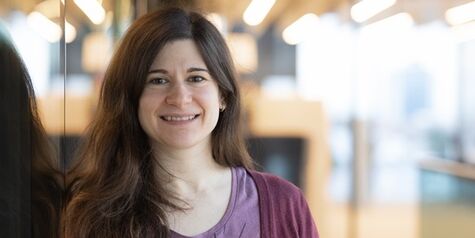
Environmental sustainability
In the area of environmental sustainability, AEB is focused on climate change mitigation, responsible consumption and production. Our activities are designed to help limit global warming to 1.5°C and minimize the consumption of resources.
Responsible consumption and production
As a software company, AEB has a low consumption of natural resources compared to companies in other sectors. The issues that concern us most here are energy consumption, land use, water consumption, and waste production. We're constantly working on these fronts to reduce our consumption. Some actions we've initiated:
- Largely eliminated paper in offices
- Adopted a policy for electronic devices at the end of their useful life - laptops, mobile phones, etc. – to be donated, passed on to employees, or refurbished
- Switched from under-utilized fixed-lease office space to variable co-working spaces at several international sites
- Minimized kitchen waste
- Reduced consumption of cow's milk and meat in favor of more alternative options (oat milk, vegetarian dishes)
Climate action
When it comes to climate action, AEB follows the principle of “first avoid, then reduce, then offset.” We began with a detailed analysis to determine the major sources of our emissions. Among the findings: employee commutes, fuel and energy consumption, business travel, and food. To reduce our emissions here, we're taking the following actions:
- Introduced sustainable energy management in our HQ by heating the office space with waste heat from our on-site data center, using our rooftop solar panels to produce electricity, etc.
- Further electrified our fleet and added new charging stations
- Subsidized sustainable commuting options like public transit and cycling
- Switched to green electricity at all sites with few exceptions
Rethinking and retooling carbon offsets
As a software company, AEB has a rather small carbon footprint. To offset the portion of our carbon footprint that we cannot eliminate through measures, we invest in internationally recognized and certified climate protection projects in cooperation with our partner Treeo: afforestation in climatically favorable but otherwise disadvantaged regions of the world. We are demonstrably helping to cool the climate by doing so.
Treeo's approach has convinced us: The carbon stored in trees as they grow is recorded using scientifically based methods and continues to be monitored after ten years when the wood is used in timber construction and turned into biochar.
Small farmers are responsible for the reforestation projects. Their income increases the better the forests are maintained and the more carbon is bound accordingly. This is supported by a specially developed app for measuring individual trees, which records the biomass obtained through reforestation. Additional satellite data and a risk buffer of 20% protect the targeted cooling effect through carbon storage against various risks.
We also support carbon sinks such as the “Pfrunger Ried (DE)” wetland.
AEB's 2024 carbon footprint
From 2023 to 2024, we were able to reduce greenhouse gas emissions by around ten percent to around 3,070 t CO2e. Per capita, the reduction was over 20% to 4.14 tons of CO2e. The largest proportion – over two thirds of our GHG emissions - is generated in Scope 3. Purchased goods and services as well as business travel account for the largest share here.
AEB is working on a decarbonization strategy that covers all three areas of emissions. The focus is on reducing Scope 3 emissions, particularly in the purchase of goods and services, business travel, and employee commuting.

Read more about sustainability at AEB
AEB voluntarily prepared a sustainability report in 2024 based on CSRD requirements. Our goal: Preparing early for future reporting obligations and establishing processes. Based on a double materiality analysis, we collected and evaluated relevant data. The report forms the basis for systematically setting up our sustainability management.
A look at some of our programs and initiatives

Vocational training in Uganda
Experts estimate youth unemployment to be around 80% in Uganda.The AEB-Stiftung provides financial support and shares technological expertise with St. Bruno Secondary School in Masaka's heavily impoverished northern district of Ssaza in the areas of IT training, infrastructure, and sponsorships.
Vehicle fleet
We’ve had a company car policy for over ten years designed to reduce emissions from our vehicle fleet. Our company headquarters and AEB offices offer free electric and hybrid vehicle charging. We even add our own self-generated solar electricity to the energy mix used to charge the cars.
Award-winning sustainable cuisine
Variety, great taste, beneficial for people and the environment is the motto of the AEB-Kantino at the HQ in Stuttgart. Seasonal dishes made from regional products are served daily and measures are consistently taken against food waste. The team recently received an award for promoting sustainable regional cuisine.
Suppliers and partners
Sustainability is a key criterion in the selection of partners and suppliers and in our procurement processes.
Restoration of the AEB garden
We want the AEB garden to become even more attractive and natural. The little-used sports field will be dismantled and some of the recommendations from the biodiversity report will be implemented. A planned pathway to our new neighboring building Zero will make it much easier to share resources in the future.
Public transit and bikes for lease
We subsidize the use of public transit for the sustainable mobility of our workforce. We also give employees the option to lease bicycles under the “JobRad” program.
More moor: Pfrunger-Burgweiler Ried Nature Conservation Foundation
AEB financially supports the Pfrunger-Burgweiler Ried foundation for nature conservation. This has helped restore an additional 15 hectares of moorland and sequester significant amounts of carbon. Twice a year, AEB employees get their hands dirty to provide practical support for nature conservation on site.
Local sharing economy
AEB’s Stuttgart HQ is part of a growing hyperlocal community of companies with a big potential for sharing and collaboration. The first step has been to open up AEB’s “Kantino” for employees of neighboring businesses. Further facilities are to be shared in the future.
Electromobility training for young women in Lebanon
Children from challenging family circumstances are offered education, lodging, and meals at the Johann Ludwig Schneller School in Lebanon. In cooperation with the AEB-Stiftung, a module for e-mobility was developed for the automotive technology vocational training course, which modernizes the training and is targeted specifically at girls.
Educational equity with KinderHelden
The nonprofit “KinderHelden” offers mentoring to children that have had a difficult start in life, and we support them through volunteering and financial assistance.
AEB Inclusive Language Guideline
The “Guide to Inclusive and Gender-Neutral Language” contains recommendations for external communication. It is available in German and English and was adapted to the respective requirements and special characteristics of the languages.
Green dreams
AEB ranks hotels based on eco-friendliness and always refers employees traveling for business to the greenest option available.
100% green energy
All our offices in Germany use green energy from regenerative sources.
Green data centers
The key component of the sustainable energy concept of our data centers is a water storage tank: The water cools the server rooms by absorbing waste heat and is then circulated through the company headquarters for heating purposes. The cool night air in the summer cools the sprinkler tank, which then helps keep the data center and the whole building cooler during the day. A photovoltaic system supplies both data centers with electricity during daytime hours.
Gambia: Support for preschool children
The Afrikaya preschool in Yundum provides children from underprivileged backgrounds with access to education, including essential English lessons. Furthermore, a music room, renovated sanitary facilities, and a trip with the children to a nature reserve demonstrate how education can also convey a sense of security and the joy of discovery.
More EV charging stations
Since August 2023, 40 charging ports with intelligent load management have been available in the parking garage under AEB headquarters. Our company headquarters and AEB offices offer free electric vehicle charging. We even add our own self-generated solar electricity to the energy mix used to charge the cars.
Refuge and education in São Paulo's slums
The AEB-Stiftung supports the non-profit organization educare that provides young people with protection and prospects. It offers regular free meals, games, and learning opportunities as well as personal support. A two-stage trainee program provides initial work experience and coaching - rewarded with a state-recognized certificate and minimum wage.
Biodiversity onsite at the AEB HQ
The biodiversity on the AEB site in Stuttgart was analyzed as part of a biodiversity report. The report attests to the AEB garden's high structural diversity without invasive species. Targeted measures such as more diverse plant species and additional near-natural structures are recommended.




















